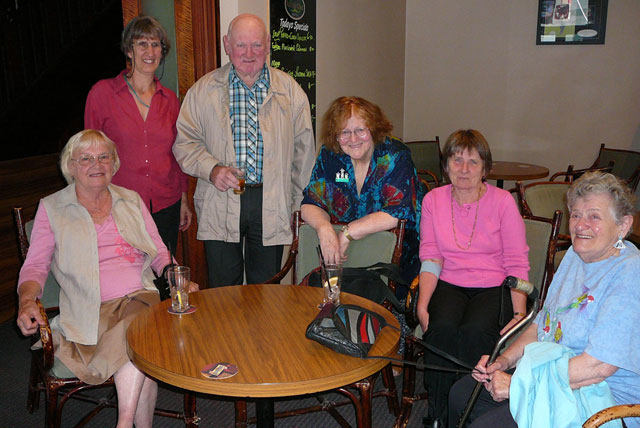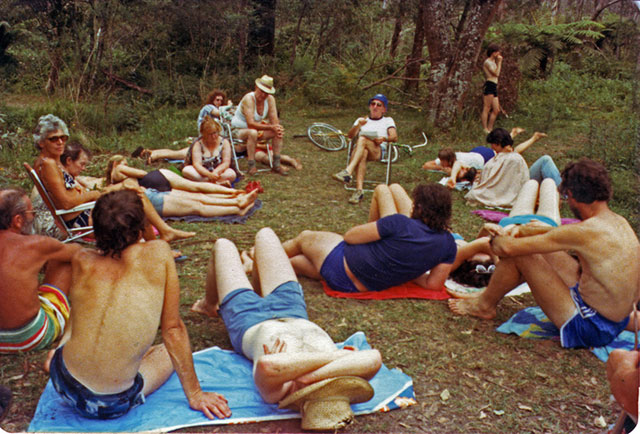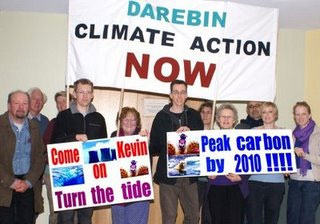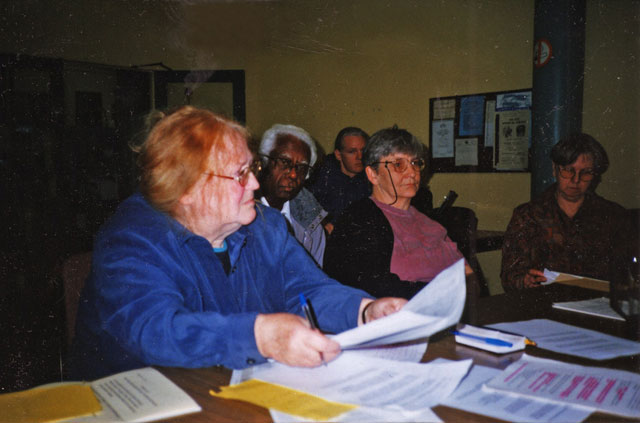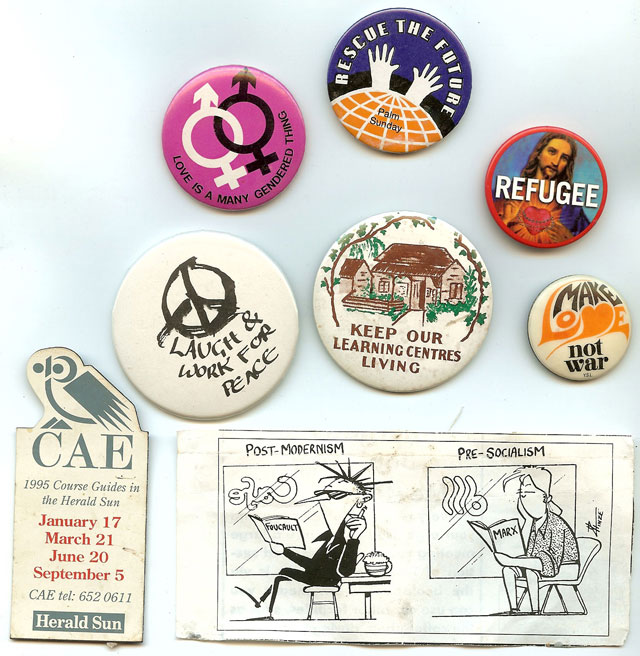Activism
A Submission
A gathering of like minds
Camp Eureka
Darebin Climate Change Group
Submissions to local government
Her badges and cartoon
Sustainability Street Institute
Retrofitting her home Media Release
Bringing Transitions Towns Training to Victoria
Other submissions
Submission – to Senate Inquiry into abolition of ATSIC commissioner
Dear Peter Hallahan
Secretary
Legal and Constitutional Committee
Room S1.House
Canberra ACT 260061
Subject: [native_title] FW: HREOC : Federal Government proposes to abolish position of Aboriginal and Torres Strait Islander Social Justice commissioner etc
I believe the changes proposed will lead to the demise of the effectiveness of the HRC (Human Rights Commission), by reducing the number of commissioners and generalising their work; the HRC is effectively turned into a Govt lap-dog by forcing it to seek the AG's permission BEFORE it can investigate any issue - (eg. refugees, Indigenous people, people with Mental Health or other issues would never get this governments approval
I would appreciate opportunity to appear before the Senate C'tee to speak to my letter but- not enough time has been allowed for proper written submissions to be written.
The proposal is to restructure the Human Rights and Equal Opportunity Commission by creating three generalist Human Rights Commissioners to replace the existing specialist commissioners (Aboriginal and Torres Strait Islander Social Justice, Race Discrimination, Sex Discrimination, Disability Discrimination and Human Rights Commissioner).
Under the Bill, none of the three Human Rights Commissioners would have specific responsibility for Aboriginal and Torres Strait Islander social justice issues. The allocation of specific responsibilities would be at the discretion of the President. The Commission as a whole, however, would still be required to submit the annual Social Justice and Native Title reports to federal Parliament.
The Bill removes the present requirement that the person appointed to the position of Aboriginal and Torres Strait Islander Social Justice Commissioner be required to have significant experience in community life of Aboriginal persons or Torres Strait Islanders. None of the proposed generalist Human Rights Commissioners will have to meet this requirement.
Current functions of the Social Justice Commissioner to promote discussion and awareness of Indigenous peoples' human rights, and to undertake research and educational programs for the purpose of promoting respect for Indigenous peoples' human rights will be maintained only as general Commission functions. They would compete for attention with the functions dealing with sex and disability discrimination, human rights and race discrimination. There is no guarantee that a future Commission will always devote resources and attention to these issues.
The current position of Aboriginal and Torres Strait Islander Social Justice Commissioner was created in 1992 largely in response to the Royal Commission into Aboriginal Deaths in Custody and HREOC's National Inquiry into Racist Violence. The role was created to ensure an ongoing national monitoring mechanism for the human rights situation of Indigenous peoples.
In 1999, the UN Committee on the Elimination of Racial Discrimination urged Australia to reconsider its attempt at that time to abolish the Social Justice Commissioner position to ensure that the absence of a specialist commissioner does not adversely affect the ability of the Commission to address in an adequate manner the full range of issues regarding indigenous peoples that warrant attention given the continuing political, economic and social marginalization faced by the indigenous community of Australia (UN Doc: A/54/18,para.21(2)).
Recent Census and other data does not suggest that there has been sufficient progress in addressing the marginalisation of Indigenous peoples since the need for a specialist Social Justice Commissioner was identified in 1992. In fact, the situation in many respects - such as contact with criminal justice processes, contact with care and protection systems, life expectancy and significant measures of health - has actually declined.
Achievements of the Social Justice Commissioner to date include:
Annual Social Justice Report to the federal Parliament (1993 - ongoing);
Annual Native Title Report to the federal Parliament (1994 - ongoing);
Social Justice package proposals (1995);
Review of Aboriginal Deaths in Custody 1991 -1996 (1996);
Co-Chair of the National Inquiry into the Separation of Aboriginal and Torres Strait Islander Children from their Families and co-author of Bringing them home report (1997);
National Indigenous Legal Studies Curriculum (1998); revised 2002-03;
Member of the Indigenous negotiation team for Native Title Act amendments (1997-1998);
Tracking Your Rights community training packages (1998);
National Indigenous Youth Forum Convenor (1999);
Briefed the UN Committee on the Elimination of Racial Discrimination about native title and racial discrimination (1999);
Briefed UN treaty committees about indigenous issues in Australia (2000);
Co-convened Moving Forward - national conference on stolen generations (2001);
Intervention in High Court Miriuwung Gajerrong case (2001);
Intervention in High Court Yorta Yorta case (2002);
Workshop on corporate responsibility and native title (2002);
Workshop on benchmarking reconciliation and measuring Indigenous disadvantage (2002).
The legislation proposes changing the name of the Commission to the 'Australian Human Rights Commission' and giving more prominence to the public education functions the Commission already exercises.
Another amendment threatens the Commission's independence as well as its potential to defend human rights effectively. The Commission will need the Attorney-General's permission to apply to intervene in a court case raising human rights principles. At present, the Commission may only intervene with the permission of the relevant Court. In 35 such interventions to date, leave to appear has been granted in every case indicating that the Commission's use of the power has been appropriate.
The proposed change would mean that the Attorney-General would be the gatekeeper of this function even in cases where the government is a party to the litigation and in circumstances
There are too many threats to human rights currently & it is often a series of small steps that leads to a destruction of the liberal-democratic system that we all value so highly as a precious achievement of Australia's diverse culture & peoples. Please do not present these changes to the parliament Sincerely Cate Kyne
Catherine Kyne
39 Howitt St Northcote
Melbourne Vic 3070
Ph 03 9481 7894
This e-mail address is being protected from spambots. You need JavaScript enabled to view it.
Sustainability street institute
http://www.sustainabilitystreet.org.au/sustainability-street-approach%11program-histroy/mentor-program/
A methodology which aims to “empower the community to empower the community"!
Thanks to all those who came from near and far to join us for a very successful first NAGA Sustainability Street Mentor Workshop. It was truly uplifting to be surrounded by such a wonderfully passionate, engaged and committed group of people, on a sunny spring day in Melbourne. There is indeed reason to be optimistic!
In the words of inspiring keynote speaker Cate Kyne:
“I feel as I did in the 60s, that there is a now a really significant mood for change”
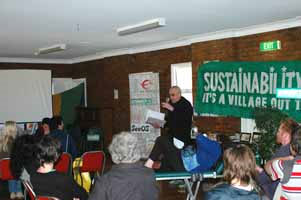
With energy, charity begins at home
Stephen Lunn | September 25, 2008 Article from The Australian
WHEN Melbourne aged pensioner Cate Kyne's inner suburban weatherboard home qualified as a test case for a free retrofit in January to make it more energy efficient, there was still a price to pay.
"I lost the grapevines on the outside of my house," the 72-year-old joked.
Ms Kyne was consoled when her gas heating system worked properly for the first time through a Melbourne winter and the chilly drafts from under the doors and skirting boards disappeared.
She qualified for the program, run in part by the Brotherhood of St Laurence, because of her low income and because her home in the northern suburbs of Melbourne was deemed to be leaking too much energy.
"There were huge gaps between the skirting boards and the floor where carpets used to be, and under the doors at the front and back," Ms Kyne said.
"And the chimneys worked too well, taking all the heat out of the house when the heating went on. The insulation in the ceiling was inadequate, and the corrugated iron roof didn't help either."
The program put in better ceiling insulation, sealed the gaps and chimney areas, and installed security screen doors at the front and back. It also added a trellis along the north side for new vines that will eventually provide shade in the summer months.
Ms Kyne doesn't know the cost, but estimated it at a couple of thousand dollars.
While it is too early for year-on-year comparisons on her electricity bill, she said she could tell her house was already operating more efficiently after just a couple of months.
"I can turn my heating off after a few hours now. I could never do that before," she said.
Ms Kyne agreed with the Brotherhood's proposal to quarantine for energy-saving measures only the compensation promised to low income earners by the Rudd Government when an emissions trading scheme is introduced.
"I come at this from the point of view of being very worried about the impact of climate change on our future generations. Even in my home, after what's already been done, there is still lots more to be done.
"I'd love solar heating for instance, and double glazing on the windows," she said.
"I think that a more energy-efficient house has health benefits for people my age -- less likelihood of flu in the winter and heat exhaustion in the summer, for example. That has to be a saving in itself."
On 24/11/2008, at 12:50 PM, Catherine Kyne wrote:
Dear Janet
I am ecstatic to hear that a Transition Towns Training program is coming to Melbourne and am very keen to book in for the Transitions Towns Training forum in Melbourne on 21st and 22nd Feb.next year. Can you give me the details - venue costs booking details yet? I was so delighted when I read the handbook because of its comprehensive approach to both community democracy, group processes, cultural action and inclusiveness, infrastructure planning as well as political education and organising
I am Victorian convenor of the IACD, a state wide community development network part of the International Association of Community Development am a member of the Australian Greens and several climate change groups. The IACD held an International Community Development and Ecology conference in Melbourne last April and a colleague and I organised the grassroots part of the conference.
I lent The Transition Handbook to Greens members for a meeting at my home prior to the local Greens' council candidates' commitment to a policy similar to Transition Towns. The council election is this Friday. After the election I will be involved in a range of initiatives for developing a Green Hub Environment Centre, community gardens, Farmers' Markets, a Green Jobs initiative and support for local climate change action groups. I am very keen that community development processes be developed in local activities as well as in the state wide CEN ( Climate Emergency Network).
I am keeping the fingers crossed, hoping that the venue will be in the inner suburbs as I have chronic back which is a nuisance when it comes to travelling a distance and will forward the 40 pounds deposit by mail
Warm Regards
Cate Kyne
Cate
Email: This e-mail address is being protected from spambots. You need JavaScript enabled to view it.
Other Submissions
... Submission 5; Mr Adam Wolfenden, Submission 7; Friends of the Earth, Submission 8 and 8a; Ms Cate Kyne, Submission 14; Pat Mackle, Submission 15; ...
Submission – to Senate Inquiry into abolition of ATSIC commissioner
See Caty’s full text
Submission – media broadcastinghttp://www.dbcde.gov.au/media_broadcasting/consultation_and_submissions/abc_sbs_review/_submissions?95073_result_page=C
cate Kyne. 1549
Submission - Statutory Review of the Gene Technology Act 2000
No. 11 Cate Kyne, State unknown.
Submission – human rights
80. Ms Catherine Kyne (Word format).

